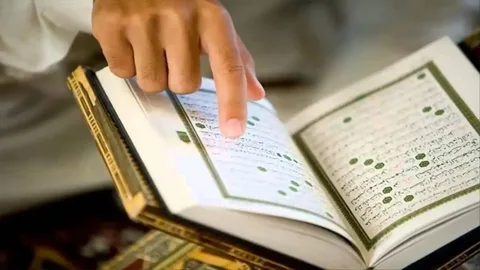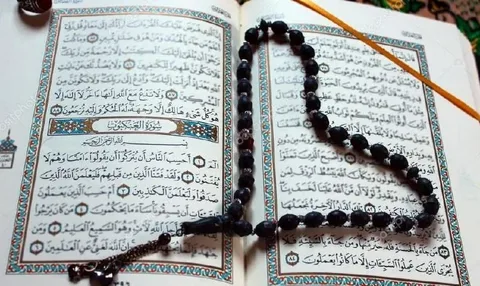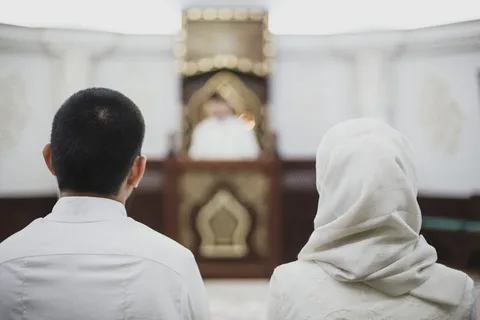Marriage is a cornerstone of Islamic life, not just as a social contract but as a significant part of one’s spiritual journey. The Quran, which Muslims believe to be the word of God, provides comprehensive guidance on how marriage should be approached, conducted, and maintained. From the purpose of marriage to the roles of each spouse, the Quran covers every aspect of this union to ensure that it leads to a fulfilling and harmonious life, in this article on Arabian Tongue we will explorer what does the quran say about marriage.
what does the quran say about marriage

In Islam, marriage is considered to fulfill half of a person’s faith. The Prophet Muhammad (PBUH) emphasized the importance of marriage, suggesting that it protects individuals from sinful behavior and helps them lead a righteous life. Through marriage, one can attain spiritual completeness by fulfilling their duties towards their spouse, family, and society.
Companionship and Support
The Quran emphasizes that marriage is a means of finding tranquility, love, and companionship. In Surah Ar-Rum (30:21), it is stated, “And of His signs is that He created for you from yourselves mates that you may find tranquility in them; and He placed between you affection and mercy.” This verse highlights the emotional and spiritual support that spouses provide each other, which is crucial for a happy and stable marriage.
Preservation of Lineage
Marriage in Islam is also intended to preserve lineage and ensure the continuation of the human race. It provides a legitimate framework for procreation and raising children in a moral and ethical environment, in accordance with Islamic principles.
Marriage as a Contractual Agreement
In Islam, marriage is referred to as “Nikah,” a sacred contract between a man and a woman. This contract is not merely a civil agreement but a solemn covenant made in the presence of God. The Quran makes it clear that marriage is not to be taken lightly and must be entered into with full consent and serious intention.
Conditions and Requirements for a Valid Marriage
For a marriage to be valid in Islam, several conditions must be met. Both parties must consent to the marriage, and there must be witnesses present. Additionally, the bride has the right to receive a Mahr, which is a mandatory gift from the groom. The Wali, or guardian, typically the father of the bride, plays a crucial role in ensuring that the marriage is conducted properly.
The Role of the Wali (Guardian)
The Wali is responsible for protecting the interests of the bride and ensuring that she is marrying of her own free will. The Quran places great emphasis on the guardian’s role, especially when it comes to ensuring that the marriage is based on mutual consent and that the rights of the bride are safeguarded.
Qualities to Look for in a Spouse

The Quran advises Muslims to prioritize piety and good character when choosing a spouse. In Surah An-Nur (24:32), it is stated, “Marry those among you who are single and the righteous among your male slaves and female slaves.” This verse underscores the importance of marrying someone who is righteous and has a strong moral character.
Importance of Mutual Attraction
While piety is crucial, the Quran also acknowledges the importance of mutual attraction and compatibility between spouses. A marriage built on love, respect, and understanding is more likely to succeed and provide both partners with the happiness they seek.
Islam encourages couples to have shared values and goals, especially when it comes to raising a family and practicing their faith. The Quran emphasizes the importance of unity in a marriage, where both partners work together towards common objectives.
The Rights and Responsibilities of Spouses
The Quran outlines specific rights that a husband has over his wife, including the right to be respected and obeyed. However, these rights are balanced with responsibilities, such as providing for the family and treating the wife with kindness and compassion.
The Rights of the Wife
Similarly, wives have rights over their husbands, including the right to financial support, respect, and fair treatment. The Quran repeatedly emphasizes the importance of treating women with dignity and kindness, and it encourages men to be patient and understanding with their wives.
Mutual Responsibilities
Marriage in Islam is a partnership where both spouses have responsibilities towards each other. The Quran encourages mutual consultation and cooperation, ensuring that both partners contribute to the success of the marriage.
The Role of Love and Mercy in Marriage
Love and mercy are central to a successful marriage. The Quran beautifully describes the relationship between spouses in Surah Ar-Rum (30:21), highlighting the affection and mercy that God has placed between them. This divine bond is essential for nurturing a loving and harmonious relationship.
The Importance of Emotional Connection
Beyond physical attraction, the Quran emphasizes the importance of an emotional and spiritual connection between spouses. This connection helps them navigate the challenges of life together, fostering a deep sense of love and commitment.
What is Mahr?
Mahr is a mandatory gift that the groom must provide to the bride as part of the marriage contract. It is a symbol of the groom’s commitment and responsibility towards his wife.
The Significance of Mahr in Marriage
The Quran places great importance on the Mahr, not as a mere formality but as a token of respect and appreciation for the bride. It is her right and must be given willingly by the groom.
Flexibility and Fairness in Mahr
The amount of Mahr is flexible and should be agreed upon by both parties. The Quran encourages fairness in this matter, ensuring that the Mahr is reasonable and not burdensome for the groom.
Polygamy in the Quran
The Quran permits polygamy but with strict conditions. In Surah An-Nisa (4:3), it states, “…then marry those that please you of [other] women, two or three or four. But if you fear that you will not be just, then [marry only] one…” This verse highlights the importance of justice and fairness in polygamous marriages.
The Importance of Justice and Fair Treatment
Justice is the cornerstone of polygamy in Islam. The Quran makes it clear that if a man cannot treat all his wives equally, he should not marry more than one. This condition ensures that polygamy is not abused and that the rights of all wives are protected.
Modern-Day Perspectives on Polygamy
While polygamy is allowed in Islam, it is not encouraged unless the conditions can be met. In modern times, many Muslims choose monogamy as it aligns more closely with contemporary values and societal norms.
Divorce in Islam
Divorce in quran is permissible in Islam but is considered a last resort. The Quran outlines a clear process for divorce, known as Talaq, which involves a waiting period and opportunities for reconciliation.
Conditions and Limitations on Divorce
The Quran places several conditions on divorce to ensure that it is not done impulsively. There are also limitations on the number of times a couple can divorce and remarry, which encourages careful consideration before ending a marriage.
Reconciliation and Remarriage
Reconciliation is highly encouraged in Islam, and the Quran provides guidance on how couples can resolve their differences. If reconciliation is not possible, the Quran allows for remarriage, but with certain conditions to ensure that the sanctity of marriage is maintained.
The Role of Family in Marriage
Family plays a crucial role in Islamic marriages. The Quran encourages the involvement of family members in supporting and advising the couple, especially in times of difficulty.
Parental Involvement and Advice
Parental advice is valued in Islam, particularly when it comes to marriage. The Quran encourages children to seek the wisdom of their parents while also respecting their own right to choose their partner.
Building a Strong Family Unit
A strong family unit is the foundation of a successful marriage. The Quran emphasizes the importance of mutual respect, love, and cooperation within the family to create a harmonious and supportive environment.
Challenges in Modern Marriages
One of the challenges in modern marriages is the conflict between cultural practices and religious teachings. The Quran provides clear guidance on marriage, but cultural customs can sometimes overshadow these teachings, leading to confusion and conflict.
Financial Pressures and Social Expectations
Financial pressures and societal expectations can strain marriages. The Quran advises couples to live within their means and prioritize spiritual and emotional well-being over material wealth.
In today’s world, relationships are more complex than ever. The Quran’s teachings provide a framework for navigating these challenges while staying true to Islamic values.
Misconceptions about Marriage in Islam
There are many misconceptions about marriage in Islam, particularly around the roles of men and women. The Quran promotes equality and mutual respect, but these teachings are often misunderstood or misrepresented.
Clarifying Misconceptions with Quranic Teachings
By referring to Quranic verses, many of these misconceptions can be clarified. The Quran advocates for a balanced and just approach to marriage quotes, where both partners are valued and respected.
Practical Tips for a Successful Marriage
Communication is key to a successful marriage. The Quran encourages couples to consult each other and resolve conflicts through mutual understanding and patience.
Balancing Faith and Daily Life
Balancing religious duties with daily life can be challenging. The Quran provides guidance on how to maintain this balance, ensuring that both partners grow spiritually while fulfilling their worldly responsibilities.
The Role of Patience and Perseverance
Patience and perseverance are essential qualities for a successful marriage. The Quran repeatedly emphasizes the importance of these virtues in overcoming challenges and maintaining a strong and loving relationship.
The Spiritual Aspect of Marriage
Marriage is not just a physical or emotional union; it is also a spiritual bond. The Quran encourages couples to strengthen their faith together and support each other in their religious duties.
Spiritual Growth as a Couple
By praying and worshiping together, couples can grow spiritually and develop a deeper connection with each other and with God.
The Role of Prayer and Worship
Prayer and worship play a central role in an Islamic marriage. The Quran encourages couples to pray for each other and seek God’s guidance in their relationship.
FAQs
What is the Quranic view on arranged marriages?
The Quran does not mandate arranged marriages but emphasizes the importance of mutual consent. Both parties should agree willingly to the marriage.
How does the Quran address issues of domestic violence?
The Quran strongly condemns any form of oppression or violence. It encourages kindness, compassion, and respectful treatment between spouses.
Can a Muslim woman initiate divorce according to the Quran?
Yes, a Muslim woman can initiate divorce (known as Khula) if she feels that the marriage is not fulfilling its purpose, provided certain conditions are met.
How important is financial stability in an Islamic marriage?
While financial stability is important, the Quran advises that it should not be the sole criterion for marriage. Spiritual and emotional compatibility are equally important.
What does the Quran say about interfaith marriages?
The Quran permits marriage between Muslim men and women of the People of the Book (Christians and Jews), but it encourages caution and consideration of religious compatibility.
Conclusion
In conclusion, the Quran offers comprehensive guidance on every aspect of marriage, from the initial choice of a spouse to maintaining a loving and supportive relationship. These teachings, rooted in divine wisdom, are as relevant today as they were 1,400 years ago. By following the Quran’s guidance, couples can build strong, harmonious marriages that not only fulfill their worldly needs but also contribute to their spiritual growth.


